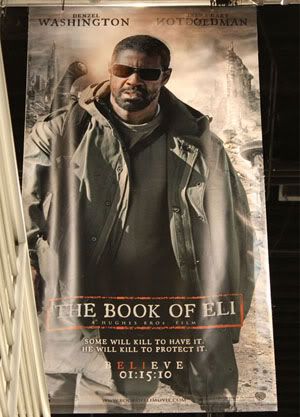
On the flight back from the UK, since the airline provided a number of free movies, I passed the time watching a couple, to save battery power in the Archos for the seven-hour layover. (Turns out Siobhan didn't use the Archos at all on the trip back, though.) The first one I watched was
The Book of Eli.
I'm going to try to avoid spoilers, but most of what I'll say won't spoil plot elements, only things about the premise and very general stuff. (There'll be a bit at the end that discusses an unambiguously spoilerish revelation, though, but I'll warn you before that comes.) Still, if you are sure you want to see the movie it might be best to stop here, just to be absolutely careful.
Boy, was this a moody, atmospheric piece. In some ways, it reminded me of
Children of Men: grim and dark, set in a sort of post-apocalyptic world, and using in some cases similar cinematographic techniques. There are even scenes which are directly reminiscent, such as a scene near the end with a wounded character paddling a tiny boat through a misty body of water towards presumed hope. There are thematic similarities, too; both stories tell of a journey undertaken by someone who is protecting a new hope from the world since lost that might be the world's restoration.
In a much more complete and overt way, though, this was a story about faith. As someone who does not have faith, and who considers Dan Barker's maxim a profound truth ("Faith is a cop-out. If the only way you can accept an assertion is by faith, then you are conceding that it can’t be taken on its own merits."), this could have been annoying. But it really wasn't. The film's creators probably intended the movie as a moving testament to the power of faith, intended to teach us all a lesson. Religious people watching it probably feel like it's going to help strengthen faith, and challenge those of us without it.
But it really doesn't. The movie is simply set in a world where that faith works: where there are, eventually, demonstrable results to having had it. It proves nothing more than me writing a story which starts out with one character saying "if you always wear a pink pixie pin, eventually a pink pixie will give you a grilled cheese sandwich," and being doubted by everyone around him, and at the end of the story, a pink pixie gives him a grilled cheese sandwich, thus proving him right. Sure: if he'd succumbed to doubt and taken off the pin, he wouldn't've gotten the sandwich. But all this tells you about is the state of mind in the imagination of the author. It's no great revelation that faith only lasts until it stops, and if it turns out to be, by coincidence, right, happening to stand by it turns out by coincidence to have been a good choice. But that's all it proves. I feel no more motivated to be religious after watching this than I was after watching
Dogma, or than I felt like taking up the techniques of the Force after watching
Star Wars. I don't live in the world of those movies.
Nor does that fact impede my ability to enjoy those movies. There weren't even many moments when
The Book of Eli got preachy, either, despite the message throughout. It mostly stuck to the story which was full of interesting turns and explorations. It was slow, but not in a bad way. The long, lingering shots of clouds really seemed to contribute something for once; though they looked like someone being too artsy and pretentious, they were the exception that proves the rule, that sometimes that actually does something, that all those artsy pretentious people are at least trying to do something real (even if 99% of the time they fail to do so).
The action was surprisingly compelling even when it was over the top and even though there wasn't nearly as much of it as the trailers made it seem. The explorations of this post-apocalyptic world were even more interesting, and the movie avoided the pitfall of so many post-apocalypse movies, where the first half hour exploring how you survive in this world is the best part, and then the "actual story" that follows is a comparative let-down (
I Am Legend was a particularly bad example there). Here, they were spread out through the whole movie, and the "actual story" was also interesting. About the only place where the movie fell into that pattern was in the end, when the "place of hope" I alluded to earlier was simply presented with little explanation -- but even there, the explanation wasn't particularly needed, and would likely have been a distraction from the point. We just don't really know much about the apocalypse, so it seemed a little convenient.
One odd thing that gradually emerged from the movie is how Denzel's character is supposed to be old. He's referred to at many points as "old man" by other characters, but I took it as just something about how people in that world call each other. It later comes out that the apocalypse is supposed to have been thirty years earlier, and he was, presumably, an adult at that time, so he's supposed to be at least fifty. But while Denzel himself is, in fact, in his 50s, he sure doesn't look it, and especially in this movie. He looks decidedly less grizzled or rumpled than many of the people calling him "old man". So while I can buy that he simply ages well (after all, if Denzel can, why not Eli? even if Denzel's got a better life than Eli, Eli has his advantages too), I can't buy that everyone around him recognizes him on sight as an "old man".
Denzel gets a lot of credit for being a great actor. Well deserved, I'm sure. This was not a movie to really show that off. His character is a great character, and in particular, he's got a level of confidence (without being swagger) that is breathtaking. Surrounded by gunmen, he is as matter-of-fact as can be that he'll be walking out as he declines the "invitation" he's being given at gunpoint, and then turns and walks away as casual as you like. You love the character, but really, Denzel isn't stretching here. There's nothing he could have done better; there's just not much that required an actor of his caliber.
There are not many laughs in this movie. And most of them that do come are so tiny that repeating them would make the movie sound awful. But in the middle of the mood they're occuring in, they are very impactful, eliciting those odd kinds of laughs that are as much out of relief as amusement, and that don't really break the feel of the scenes around them, just sharpen them through contrast. There are more than a few moments when it seems impossible for the story to continue, and then it does anyway, and (apart from the general tone of Eli being inexplicably bad-ass) few of these come off as contrived or unbelievable. And there are quite a few moments of potent emotion: fear, triumph, and bittersweet mixtures of these and other things.
The one big spoiler follows after the break. Stop now!

At the very end, it is "revealed" that Eli has been blind the entire movie. The IMDB trivia page claims that when you go back through the movie, there are clues throughout about this. It does answer one thing that I had earlier thought was a little filmmaking mistake -- the time he feigned having left his glasses inside to trap Solara, and was outside without them and with his eyes open.
But I wonder, if I go back and re-watch the whole movie, will I really buy that he was able to do everything he did? Even if you buy the myth that blind people develop superior hearing and other senses (they actually just get better at paying attention to them, but they gain no actual acuity), I have a hard time believing that I won't find moments where there's no way he could have known something he clearly knew. A few of these jump right out at me as possibilities already. Maybe if I watched it I'd be able to plug them all, but I doubt it. I think we'd have to conclude that the voice in his head -- presumably God -- was telling him things all along. In which case, him being blind really doesn't matter much, does it?
All in all, I felt that this revelation was a let-down. The whole point of it, apart from the artsy element of making him a "blind prophet" and thus following in the historical and mythological precedent of Tiresias and others, was that the book was in Braille all along, so Carnegie could never have used it. (And yet, one of his coterie was a blind woman who knew Braille -- or so I took it from the look on her face during the brief moment she touched the book. So it being in Braille isn't even why he couldn't read it; it was only because his injuries and losses by that point had undermined his power to force her to read it for him.) This would have been just as well served by having Eli being sighted and still able to read Braille. In a way, that would be cooler -- a "failsafe" to his protection of the book.
This is by no means a slight against the blind, or any other form of disability or handicap. It's just that, as a storytelling device, making him turn out to be blind but making this a surprise puts too much strain on the story. It's like the surprise at the end of
The Sixth Sense done wrong. In
The Sixth Sense, the moment you got it, you realized with a sudden rush that it was absolutely true, unquestionably, that it explained so many things, that it all fit. But at the moment of revelation in
The Book of Eli, you just feel (or at least I just felt) dubious that it really works, that the movie would still make sense. While it might turn out that I could explain every scene if I rewatched it, there's no sense of the inevitability, no reaction of "of course he was blind, it all makes sense now" like that in
The Sixth Sense.
Then again, maybe this is another point about faith. Maybe those with faith would feel like the revelation works perfectly and don't need to go back to rewatch the movie to verify that. Maybe only those of us who find doubt and proof more meaningful than "blind" (pun intended) faith are the only ones who'd find this a less than satisfying resolution. If so, did the moviemakers set out to undermine the movie's apparently-intended (but ultimately doomed) message about faith specifically amongst the people they most wanted to (but never could) reach with it?
I don't think I care nearly enough to go watch the movie's commentary tracks to see if they talk about this. I'm not even sure I care enough to rewatch the movie to see if the blindness thing works. I'm happy I watched it, but I don't know that watching it again would be worth the cost of whatever else I might have done with those two hours. Maybe I will, maybe I won't.
 Given that I'm about three weeks ahead on blog posts, when I say that "today" we went to see Knight and Day, I mean back on July 10th. I was expecting a light-hearted, goofy, funny action movie, and that's precisely what I got.
Given that I'm about three weeks ahead on blog posts, when I say that "today" we went to see Knight and Day, I mean back on July 10th. I was expecting a light-hearted, goofy, funny action movie, and that's precisely what I got.
























 RealTime and RTC
RealTime and RTC Prism
Prism Uncreated
Uncreated Bloodweavers
Bloodweavers Foulspawner's Legacy
Foulspawner's Legacy Lusternia
Lusternia